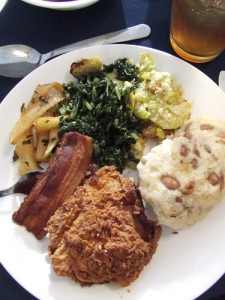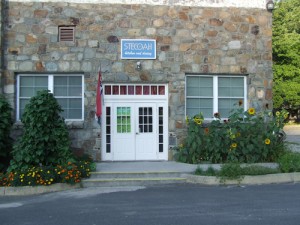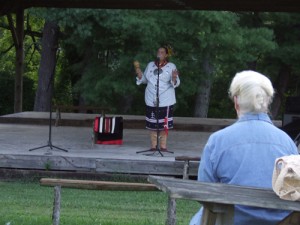by David Cecelski
Last week we happened to be passing through Stecoah, inGraham County, on one of the two Friday nights each summer that the Stecoah Valley Cultural Arts Center hosts a supper of Cherokee traditional foods. Located in a beautiful old stone schoolhouse, the Center is a non-profit community group dedicated to preserving Appalachian mountain heritage and supporting the local community.
We had passed Cherokee historical sites all the way from Hayesville to Lake Santeetlah. We drove by an ancient ceremonial mound, the former sites of river villages, and historical markers for forts where U.S. Army troops confined thousands of Cherokee during the Removal in 1839. We skirted the Snowbird Mountains, too, where the prophet Tsali fought the US Army.
At the Stecoah Valley Center, we walked into the old stone schoolhouse’s cafeteria through a door bordered by sunflowers, tomato vines, and climbing beans. The dining room was cozy, just big enough for maybe 40 or 50 people. We shared a long table with a family from Raleigh who had come to the mountains for an annual children’s trout fishing derby in Cherokee.
Soon a very nice waitress brought us big, family-style bowls of fried chicken, spare ribs, bean bread, fresh greens, squash casserole, and potatoes seasoned with wild leeks called ramps.
I was especially enthralled by the bean bread, a very traditional Cherokee dish. Made with cornmeal and dried beans, bean bread contains the two staples of the traditional Cherokee diet, corn and beans, and these days it’s usually made a lot like a dumpling.
Another version, called broadswords, more closely resembles a tamale to me, except they’re boiled, not baked. To make broadswords the old-fashioned way, the cook molds the cornmeal and beans (and usually a little grease or butter) pretty flat, wraps them in corn blades or cured corn fodder (or sometimes tree leaves), ties them shut and boils them until done.
At the Stecoah Valley Center, everything was delicious, the company wonderful. A very friendly cook came out of the kitchen and visited with us for awhile and told us more about some of the foods that we were eating. Later, we had blackberry cobbler, probably the best I’ve ever had.
After dinner, we joined a small crowd that had gathered to watch a moving performance of Cherokee music, storytelling, and dance in front of the old school. A singer named Paula Maney, a member of the Eastern Band of Cherokees, opened the evening, and her voice was lovely and unforgettable, like everything in Stecoah.
The Stecoah Valley Center hosts concerts, festivals, and arts projects, as well as a K-8 after-school program, summer camps, and other ventures. The Center also does a lot with traditional mountain foods: cookery workshops, the Cherokee suppers, and 10 traditional Appalachian suppers on Saturday nights during the summer. For more information or to sign up for workshops, make dinner reservations, or get concert tickets, check out www.stecoahvalleycenter.com or call (828) 479-3364 .



Leave a Reply